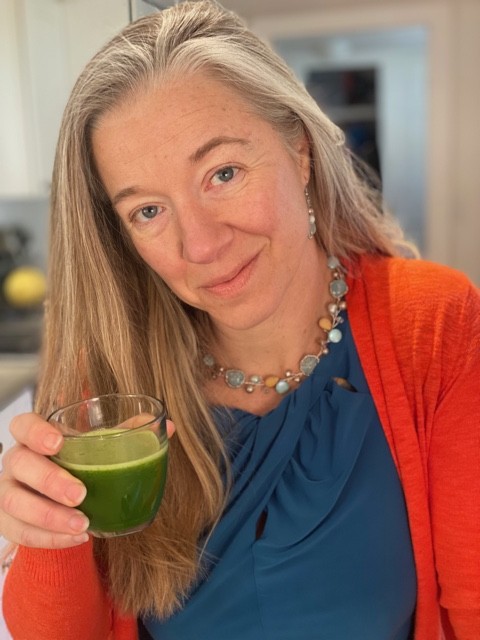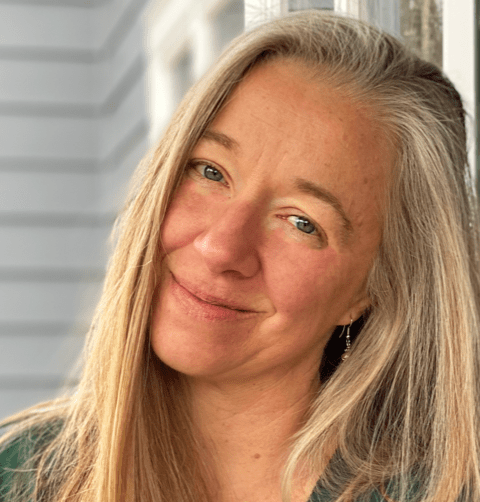
Love Yourself to Wellness: Thais Harris’s Holistic Formula for Optimal Health
Thais Harris, BCHN, is a board-certified nutrition consultant who empowers women to love themselves into better health and an outstanding life. Through her signature Reset group program, online courses, and individual + family wellness coaching at Nourish Together, she has successfully guided hundreds of people on their journey to optimal health. A graduate of Bauman College and the California Institute of Integral Studies, Thais blends science-based Eastern and Western healing techniques, focusing on each client’s unique needs through DNA analysis and lab markers. As the Nutrition Manager for the Ceres Community Project, she supported cancer patients while training teens as chefs and gardeners, fostering a “seed to healing” experience. Thais also taught Therapeutic Nutrition at Bauman College, helping students launch their practices. She draws from diverse training in Ayurveda, Amino Acid Therapy, and Nutrigenomics to deliver personalized care. As a co-author of the best-selling book *The Life-Changing Power of Self-Love* and author of the children’s book *Little Red*, Thais is passionate about the transformative power of wellness. Her mission is to help people achieve optimal health by nourishing both body and mind.

Your approach to health and wellness integrates both Eastern and Western healing modalities. How do you blend these traditions to create personalised plans for your clients?
The first guideline in my work with clients is that they are the experts in their experience, and I prioritize that information first, through an intake form, a health appraisal questionnaire, and a 90-minute intake session (so I can truly listen to what they need, what they desire, and how they want to achieve it). Then I offer tools such as functional medicine tests, which can include DNA data, current labs, organic acid testing, food sensitivity testing and microbiome assessment (GI Map). The third step is to put all the answers and data together and add a layer of insight from the perspective of traditional cultures and ancient science such as Ayurveda. With all of this in place, we can co-create a custom path that addresses the whole person and focus on the strategies that will create the most meaningful transformation.
Your signature Reset group program has guided hundreds toward optimal health. What inspired you to create this program, and what sets it apart from other wellness programs?
I love working with individuals, and early in my career I also saw the power of working in a group setting. I love how the energy of the group inspires more action for each participant, and how we all learn from each other. When I offered my first Reset in 2012, at a spa in San Francisco, I saw the benefit that a short-term program had in long-term health, and I have continued to offer the Reset since, twice a year. As I have grown and advanced in my own continuing education, I have added new strategies for each iteration of the group.
What makes The Reset so effective is the combination of the power of group dynamics, carefully crafted meal plans that are designed to help participants gently cleanse while feeling sated, easy-to-understand (and implement) educational materials, and support to help ensure long-term success after the program. I also bring in the self-love work that is so necessary when embarking on a health journey, something most practitioners in my field don’t include in their programs.
As someone trained in Ayurveda, Amino Acid Therapy, and Nutrigenomics, how do you determine which modality best suits a client’s unique needs?
As I sit with each client, and review their questionnaires, their goals, labs, and their lifestyle, the priorities – and therefore the tools to address them – become clear. There is some overlap in strategies from different modalities, such as increasing the nutrient density of meals and bridging gaps through supplements. Some clients are more interested in Ayurvedic principles, some are more focused on their DNA and how to use data to improve health and prevent conditions they may be predisposed for. Amino Acid Therapy comes into place when clients are not getting enough protein and have specific concerns around neurotransmitter health (mood & mental health) and eating disorders. Ultimately all clients receive an approach based on holistic principles, getting support for gut, heart, and mind, so they can find physical and emotional balance and enjoy life more fully.
During your time as the Nutrition Manager at Ceres Community Project, you worked with both cancer patients and teens. Can you share a memorable experience from this period that influenced your current practice?
The most rewarding times at Ceres were the teen circles (group meetings) when clients who were receiving our meals would come to visit the teens and share their stories. There were often tears as clients would say to teens: “You saved my life,” and “I was so touched you cared about me, a stranger, to make these delicious meals for me,” or “The bright light during my treatment was receiving the meals and feeling the love coming through with each dish.” At each of these statements, I could see the teens grow an inch taller with pride and a sense of true contribution to our community – something that is lacking for teens in most societies.
The sense of being cared for was such a big part of the healing, and in my practice, I help clients create that for themselves.
I also loved teaching our community classes, which I have continued to do through my private practice. I currently teach classes at Berkshire South Community Center, local schools, and online as often as possible.
You’ve taught Foundations and Therapeutic Nutrition at Bauman College. What do you believe are the most critical aspects of nutritional education that new practitioners should focus on?
Staying curious, practising deep listening, and continuing to learn are the top skills for any practitioner in the health field. Using common sense, understanding the practices of traditional cultures, and questioning fads are next.
New research – about the microbiome, about our genes, about our environment – is being released daily, and we have just begun to integrate this vital information into the health and wellness field. Keeping a pulse on the new science while being rooted in ancient wisdom is my guiding principle.
With that said, looking to gut health and stress reduction as the entry points for everything else happening in the body is an effective place to start working with clients.
Your work emphasizes the importance of self-love in achieving better health. How does this philosophy influence your wellness coaching, and what advice would you give to someone struggling with self-compassion?
Our thoughts create emotions and the two together shape our reality. I have seen again and again how difficult it is to improve health when any amount of self-loathing is present. We have to address the love first (or at least simultaneously with any plan of action) – and connect with the source of it within ourselves. When we cultivate self-compassion and deep care, making healthy choices becomes more straightforward.
When we beat ourselves up, doubt our capacity to improve, and find fault with our bodies constantly, we perpetuate a cycle of stress that keeps us feeling defeated, and unmotivated to take positive action. In addition, this stress has physiological consequences that can hinder our ability to digest, detoxify, and heal.
I invite readers to download my guide “3 Mindset Shifts Love Yourself Into Better Health” here. This quick guide offers small steps for cultivating self-compassion, kindness and love.
Link: https://thaisharris.systeme.io/loveyourself
In your book “The Life-Changing Power of Self-Love,” you explore the impact of self-love on personal transformation. How has this concept shaped your journey toward health and wellness?
This book is a collaboration of 13 authors and the offer to join my co-authors came at such a momentous time in my life. My chapter is called “No More Cringing in the Mirror: What Skin Cancer Taught Me About Self-Love” and in it, I share my path towards deeper self-love and healing.
Although I studied and practised many loving modalities such as mindfulness, yoga, and meditation, it wasn’t until a big black cancerous mole grew on my face that I started the journey in earnest. That first skin cancer forced me to love and accept myself in ways I had not known before. Every time I looked in the mirror, I was invited to choose love and healing rather than fear and repulsion. The repeated choice toward love brought many blessings, including the spontaneous healing of the squamous cell carcinoma, with the mole falling out and the skin around it being completely cancer-free.
I had other skin cancers after that one, including basal cell and melanoma, in different parts of my body, and each time I was able to love myself through the healing process because of the practices I now had in place.
With your experience in DNA analysis and current lab markers, how do you incorporate these scientific tools into your coaching to enhance client outcomes?
Some clients are very tuned into how they feel and might not need DNA and lab data to measure their success. However, for clients who enjoy seeing how their markers improve with our work, labs are a fundamental piece for assessing progress.
When we combine both DNA data and labs, we get a more complete view of what certain predispositions are, and what is happening in the present moment, and then make choices based on those two data sets combined. For example, if a client has a genetic predisposition for an increased need for B12 vitamin, and then the labs show this client is low on B12 vitamin, we work on ensuring the client gets more bioavailable B12 vitamin. Another example is if a client has a pre-disposition for irritable bowel, or for gluten sensitivity, and a GI Map test shows us their immune system is reacting to gluten, we remove gluten from their diet – and see big improvements in how they feel right away. This approach takes some of the guesswork out of the picture so we can be more strategic in what, when, and how we tackle each goal.
Your children’s book “Little Red” introduces young readers to concepts of health and wellness. What motivated you to write this book, and what message do you hope to convey to the younger generation?
Being a mom to an almost 10-year-old, with another baby on the way (I am happily, naturally pregnant at 44 years old!) I am committed to helping children understand the healing power of whole foods and feel motivated to eat – and enjoy – these foods. I have taught children about food and nutrition since 2012 when I was part of Rainbow Chefs, an educational organization teaching cooking and nutrition at schools. Later I started a “Kids In the Kitchen” program through Ceres at multiple Sonoma and Marin County libraries in California, and I continue to teach children today, online and in person. The book is part of my commitment to teach and inspire young people to be more curious about vegetables and fruits and more willing to consume them daily.
Little Red is the first of a series. In Little Red, readers meet other veggies and fruits at the farmer’s market, including Per Simmon (which will be my next book), Brok Oli, Bay Sil, Tom Ato, and Blue Belle. Eventually, each of these characters will have their book, and get to share their benefits with the reader – who will hopefully become their eater!
I truly believe that if we can give kids a stronger nutritional foundation, we will reverse the upward trend in disease we are facing right now.
As a practitioner who has successfully guided hundreds of people, what do you believe are the key elements to sustaining long-term health and wellness, especially for women looking to lead outstanding lives?
– First: connect with the love inside of you every day. This love will grow the kind of appreciation that allows for self-care in a new, more grounded and complete way.
– Listen to your body and make time for the things that matter: joy, rest, nourishment, connecting with people you love (and who love you back and uplift you).
– Make meal planning, prepping and cooking a fun activity. Rather than seeing it as a chore that takes too much time, think of it as a way to show love towards yourself and anyone else you provide meals for. Think of the freedom that having a meal plan and a shopping list will give you when you don’t have to start from zero every night for dinner. Turn the music on while prepping and cooking, have a friend over (or have them on speaker if you can’t be in person). Start a recipe club. Make extra servings to freeze. Cooking for yourself is one of the best ways to feel connected to your environment and to your body, and ensures you know exactly what is going into your system.
– Move with joy – over-exercising can be punishing to hormones, and not moving enough will have detrimental effects too. If you sit for long periods at work, enjoy movement “snacks” every hour – a few calf raises, a walk around the office, some nitric-oxide-releasing squats, and wall push-ups all work here. Play your favourite dance music after dinner and let it all loose for a few minutes: a mini dance party will help with post-meal blood sugar regulation, and more importantly, it will lift your mood!
– Work with a practitioner to understand your microbiome, your potential sensitivities, your blood sugar, and your hormones. It is wonderful to stay well-informed, but too often the advice of books, magazines and podcasts (eat less carbs, fast longer hours, avoid oxalates) may not apply to you, and you’ll only feel discouraged after trying strategies that work for other people but aren’t right for you.

APPLY TODAY
100 Top Global Women Entrepreneurs – Global Woman Magazine
Our Journey in 12 Months:
Our Journey in 12 Months – Global Woman Magazine
5 Things That Show Money is Not Evil:
5 Things to Show That Money Is Not Evil – Global Woman Magazine
Global Man Magazine Page:
Global Woman, Global Man: Socials:
Global Woman Magazine (@global_woman.magazine) • Instagram photos and videos






